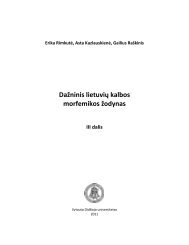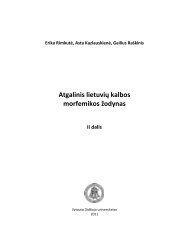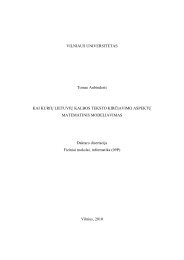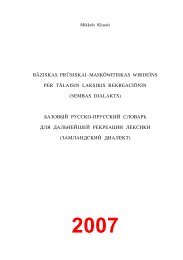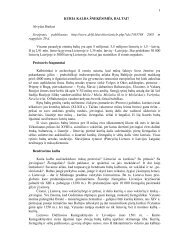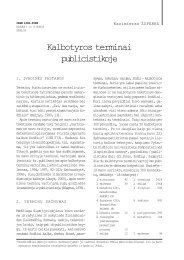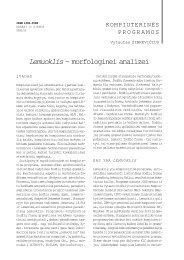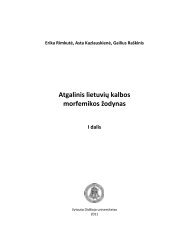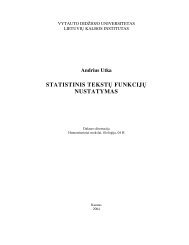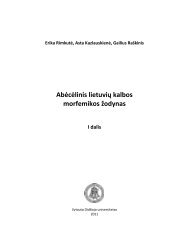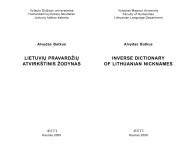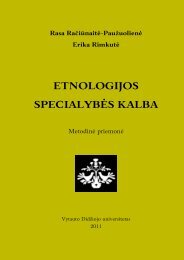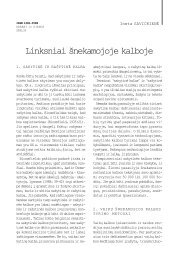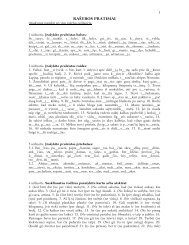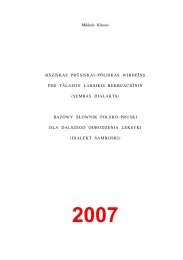HISTORICAL GRAMMAR OF OLD PRUSSIAN
HISTORICAL GRAMMAR OF OLD PRUSSIAN
HISTORICAL GRAMMAR OF OLD PRUSSIAN
Create successful ePaper yourself
Turn your PDF publications into a flip-book with our unique Google optimized e-Paper software.
<strong>HISTORICAL</strong> <strong>GRAMMAR</strong> <strong>OF</strong> <strong>OLD</strong> <strong>PRUSSIAN</strong><br />
became palatalized (D’), spelled as -ti-, -di-, e.g.: median (E) ‘forest’,<br />
crixti`nai (III) ‘Christians’ etc. Pr. gçide (III) ‘waits’ ends in -de coming<br />
from *-d’a < *dja.<br />
The same is after gutturals, cf. dragios (E) ‘yeast’ with -gi- reflecting<br />
Pr. *-g’- (< *-gj-).<br />
* 24. Pr. *r + *j and *l + *j turned into palatalized Pr. *r’, *l’. The<br />
latter are spelled ri, ry, rg and resp. li, lg, lig, e.g.: (E) garian ‘tree’, karyago<br />
‘military campaign’, *kargis ‘army’ (PEÞ II 119), angurgis ‘eel’ (with -rg-<br />
= Pr. *-r’-) etc., kelian ‘lance’ (with -li- = Pr. *-l’-), ansalgis ‘welt’ (with<br />
-lg- = Pr. *-l’-, cf. PEÞ I 81), saligan ‘green’ (with -lig- = Pr. *-l’-, cf. PEÞ<br />
IV 43).<br />
* 25. Pr. *s with subsequent *j turned into *ð, or *ð’, (spelled sch)<br />
before back vowels, e.g.: schuwikis (III) ‘shoemaker’, acc. fem. schan /<br />
schian (III) ‘this’ etc.<br />
* 26. Balt. *• > Pr. *v. This Pr. *v is spelled with the letter w in<br />
most instances in written documents, cf. Deiws (III) ‘God’, Deywis (E)<br />
‘idem’. Accidental spellings with the letter u reflect its non-syllabic pronunciation,<br />
i.e. *• or *-(u)• (cf. Endzelîns SV 34 f.), e.g.: (I) gen. Deiuas<br />
‘idem’, acc. Deiuan ‘idem’, (E) preartue ‘reutel, plough-knife’ (PEÞ III<br />
346), schutuan ‘twisted yarn’ (PEÞ IV 88).<br />
Letters -ff- in spelling dr¾offs ‘faith’ render the same spirant Pr. *-v-.<br />
Prothetic Pr. *v- [*•-] is not rare, cf. woasis (E) ‘ash-tree’ (PEÞ IV<br />
259), wosux (E) ‘he-goat’ (PEÞ IV 265 f.), wuschts (I) ‘eighth’ etc.<br />
* 27. Pr. *s comes either from Balt. *s < IE *s, or (as well as Latv.<br />
s) from Baltic *ƒs (> Lith. ð) < IE *k.<br />
Pr. *z (as well as Latv. z) comes from Balt. *ƒz (> Lith. þ) < IE *g.<br />
Pr. *s and *z are spelled with the same letter s in written documents.<br />
For Pr. *s < Balt. *s cf. soûns (III) ‘son’, snaygis (E) ‘snow’ etc.<br />
For Pr. *s < Balt. *ƒs cf. sunis (E) ‘dog’ (cf. Lith. dial. ðunÑs ‘dog’) etc.<br />
For Pr. *z cf. semo (E) = *zçm¯É ‘winter’ < *z…eim¯É < *ƒzeim` etc.<br />
23



